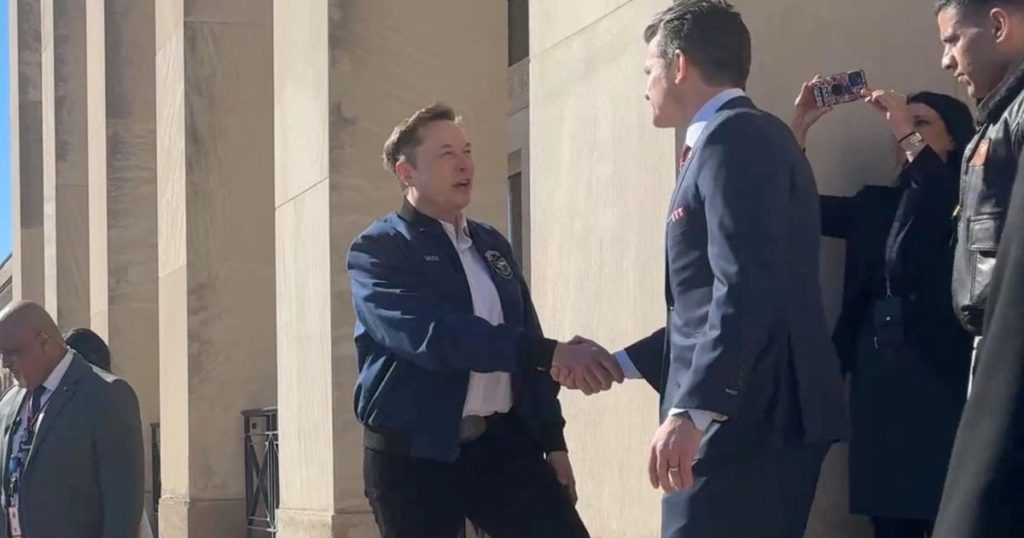Elon Musk’s recent visit to the Pentagon has stirred up significant discussion regarding his role and influence within U.S. defense strategy. On Friday morning, Musk met with Defense Secretary Pete Hegseth to discuss topics related to “innovation, efficiencies, and smarter production.” This visit came amidst reports questioning whether Musk would be briefed on potential war plans involving China, which Hegseth has publicly denied as “fake news.” The meeting’s focus appeared more aligned with enhancing collaboration between the government and Musk’s business ventures, which include influential companies like SpaceX and Starlink.
| Article Subheadings |
|---|
| 1) Meeting at the Pentagon: Details and Context |
| 2) Musk’s Involvement in U.S. Defense |
| 3) The Fiasco Over War Briefings |
| 4) Musk’s Companies and Government Contracts |
| 5) Reactions and Implications of the Visit |
Meeting at the Pentagon: Details and Context
On March 21, 2025, Elon Musk arrived at the Pentagon for a meeting intended to explore potential avenues of cooperation with the Department of Defense. Accompanied by Defense Secretary Pete Hegseth, the discussion was centered on advancing innovations and enhancing production efficiencies within the military sector. Hegseth, who has been vocal about integrating private sector intelligence into defense strategies, highlighted the need for modern techniques in military operations.
The meeting was conducted amidst heightened geopolitical tensions, primarily concerning relations with China. Musk’s presence at the Pentagon underscores a growing trend of technology leaders taking a more direct role in national security discussions. As the head of multiple companies that focus on cutting-edge technology, Musk’s insights could potentially shape strategic decisions within defense.
Musk’s Involvement in U.S. Defense
While Musk is not officially designated as a military adviser to the president, his influence extends through the various technologies his companies provide. Both SpaceX and Starlink offer crucial services to federal agencies, enhancing communication and satellite capabilities essential for modern military operations.
With the intention of streamlining government processes, Musk has been advocating for reductions in federal bureaucracy, particularly within the Defense Department. His presence in discussions about government efficiency reveals an interest in merging business innovation with military needs, which can lead to more effective defense strategies.
The Fiasco Over War Briefings
Before the meeting, allegations arose suggesting that Musk would be informed about plans regarding a potential military conflict with China. Hegseth vehemently denied these reports via a post on social media platform X, dismissing them as “fake news.” This clarification reflects the sensitive nature of national security communications and the importance of maintaining confidentiality regarding military strategies.
However, the rumors surrounding Musk’s involvement raised questions about the boundaries between private enterprise and national security. Hegseth’s efforts to quell these rumors came as a necessary response to maintain focus on the primary agenda of the meeting, which was enhancing production efficiencies rather than engaging in sensitive military discussions.
Musk’s Companies and Government Contracts
Musk’s enterprises, such as SpaceX, have garnered several lucrative contracts with the U.S. government, including collaborations with NASA and the U.S. Air Force. These partnerships not only demonstrate the trust placed in Musk’s companies but also highlight his role as a key player in the defense technology sector.
The Pentagon’s reliance on Musk’s companies for innovations such as satellite communications and launch services makes his input valuable in discussions about defense production and technological advancements. With ongoing projects that integrate AI and space technology, Musk’s expertise aligns with the Pentagon’s interest in modernizing its operational capabilities.
Reactions and Implications of the Visit
The meeting at the Pentagon was met with mixed reactions among observers, particularly regarding the intertwining of Musk’s business ambitions and national defense strategies. Critics voiced concerns that private interests could overshadow military needs, leading to conflicts of interest. Others, however, applauded the initiative to incorporate innovative thinking into state defense.
Hegseth and Musk are slated to announce a contract award related to the development of sixth-generation fighter jets, further consolidating the partnership between advanced technology companies and the Defense Department. This cooperation symbolizes a broader trend towards greater integration of tech industry advancements in traditional defense strategies, potentially enhancing America’s strategic edge in military capabilities.
| No. | Key Points |
|---|---|
| 1 | Elon Musk met with Defense Secretary Pete Hegseth at the Pentagon to discuss innovation and efficiencies in defense. |
| 2 | Hegseth denied reports that Musk would receive war briefing plans about China. |
| 3 | Musk’s companies maintain significant contracts with various government sectors, influencing military technology. |
| 4 | The meeting’s agenda was focused on enhancing production efficiency, distancing it from controversial defense matters. |
| 5 | The partnership between Musk’s ventures and the Pentagon indicates a growing trend of tech integration within military operations. |
Summary
The meeting between Elon Musk and Defense Secretary Pete Hegseth marks a significant moment in the evolving relationship between the tech industry and U.S. defense strategies. While Musk’s involvement in defense discussions has raised questions about potential conflicts of interest and the balance between innovation and security, it underscores the increasing reliance of military operations on advancements from private sector capabilities. As the U.S. navigates complex international relations, integrating technological innovation will be crucial in maintaining strategic advantages.
Frequently Asked Questions
Question: What were the main topics discussed in Musk’s meeting with Hegseth?
The meeting primarily focused on “innovation, efficiencies, and smarter production” relevant to the Defense Department, rather than military briefings regarding potential conflicts.
Question: Why did Hegseth deny the report regarding Musk being briefed on plans involving China?
Hegseth labeled the report as “fake news,” emphasizing that the focus of the meeting was collaboration on enhancing production rather than sensitive military strategies.
Question: How does Musk’s influence extend into U.S. defense strategy?
Musk’s companies have key government contracts that incorporate advanced technology into defense operations, positioning him uniquely within discussions about modernizing military capabilities.


